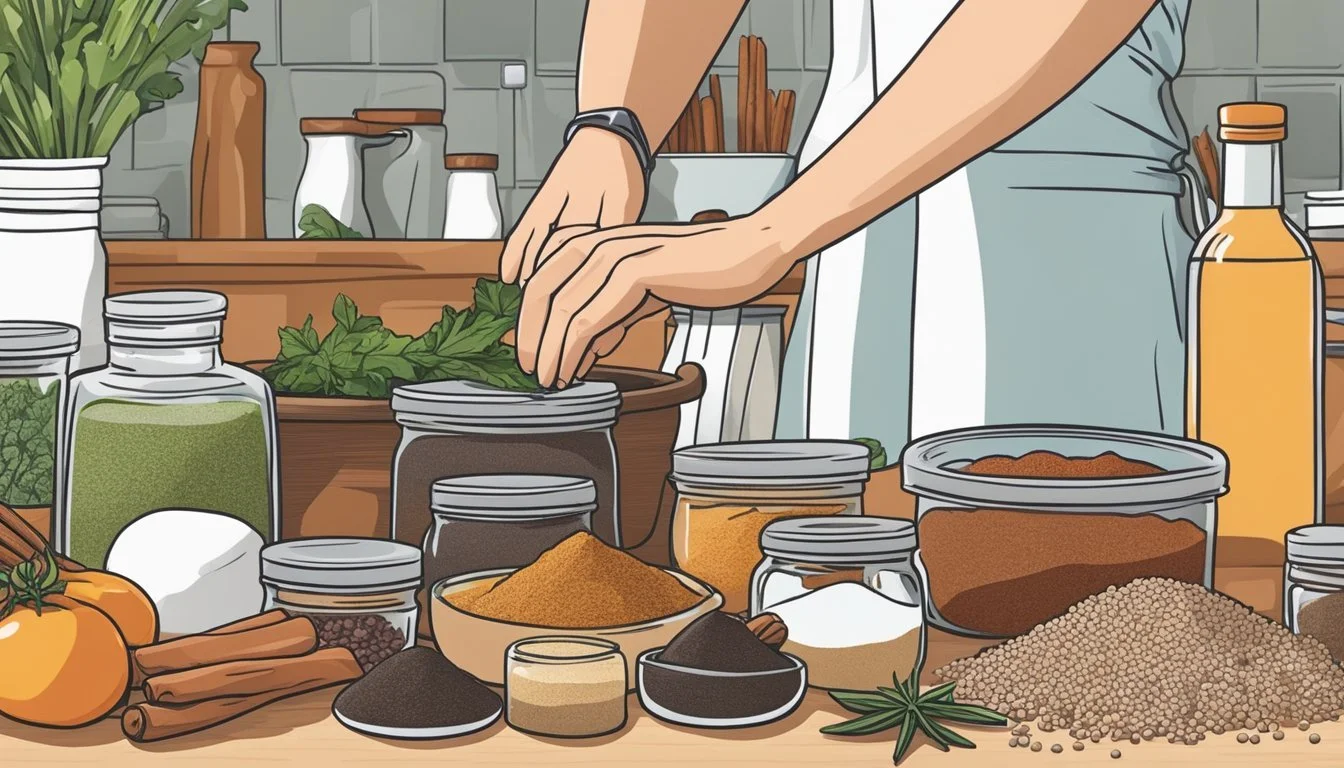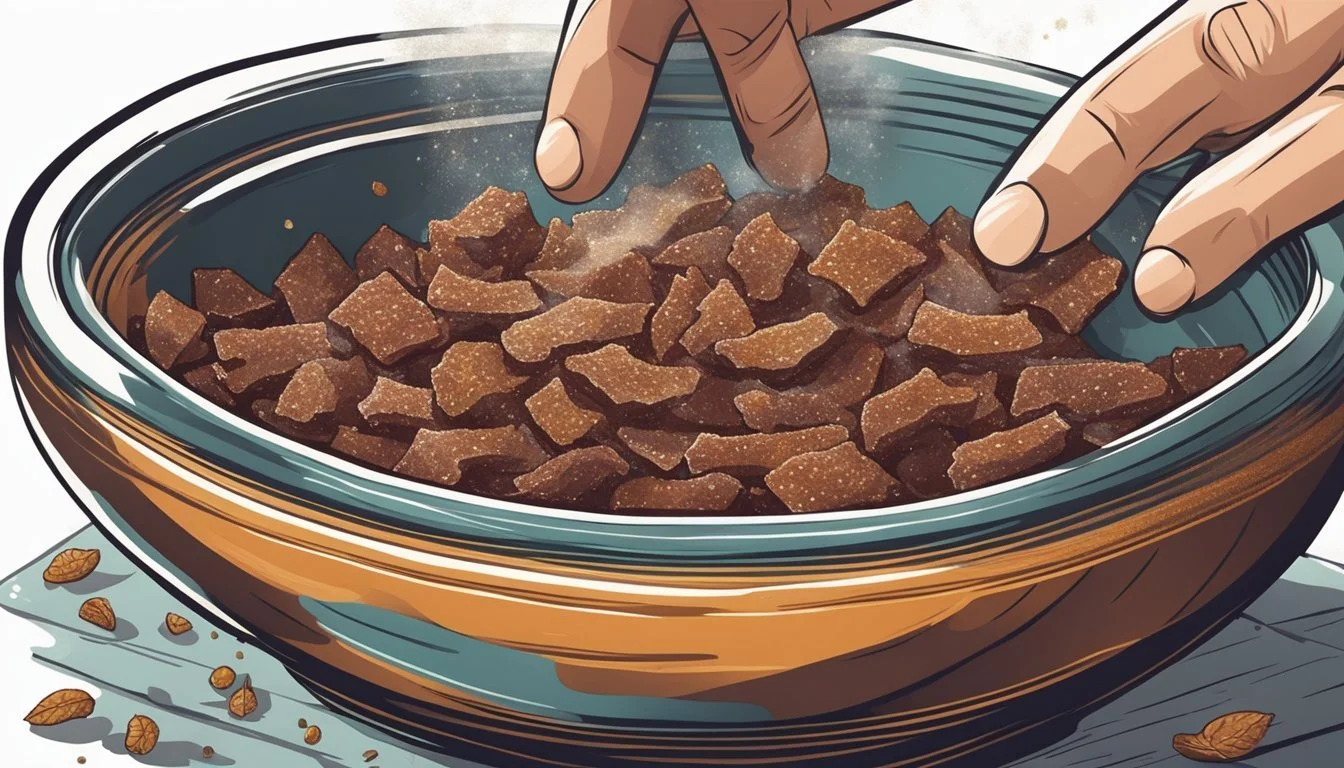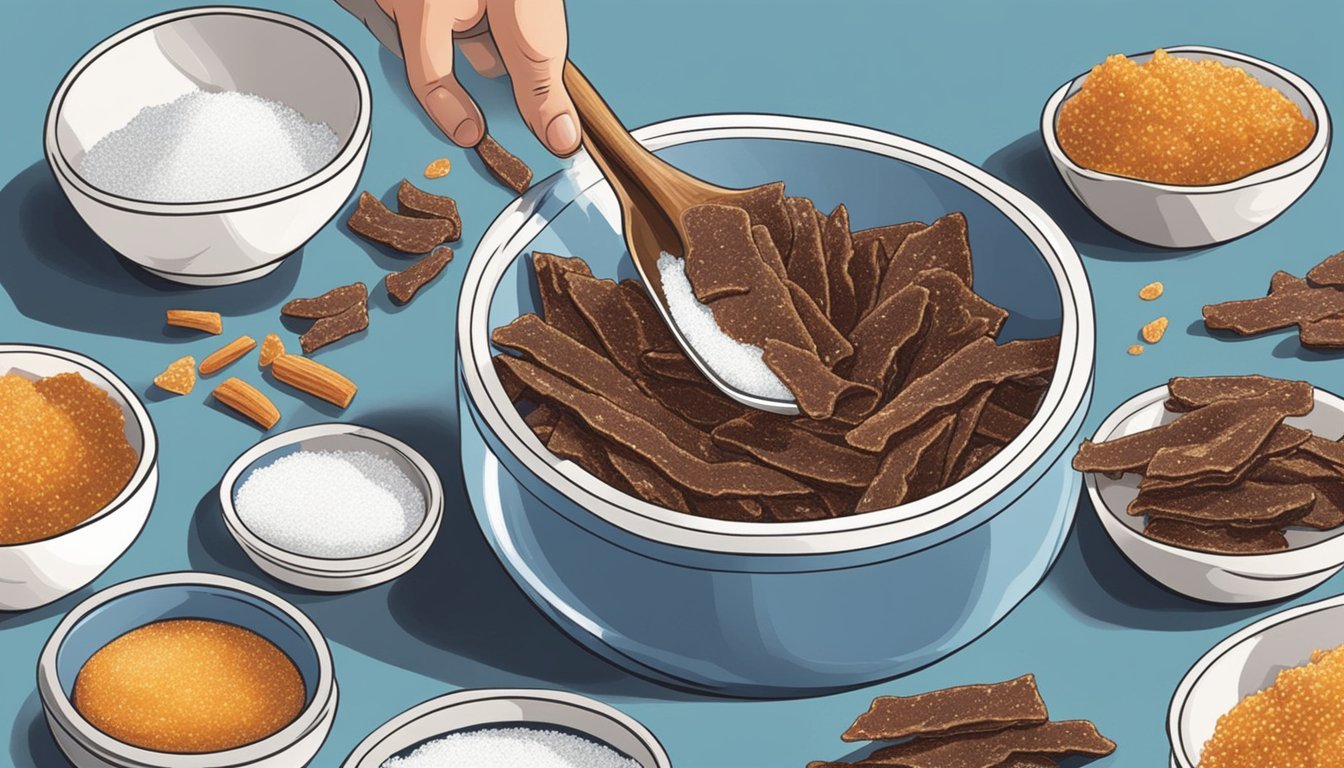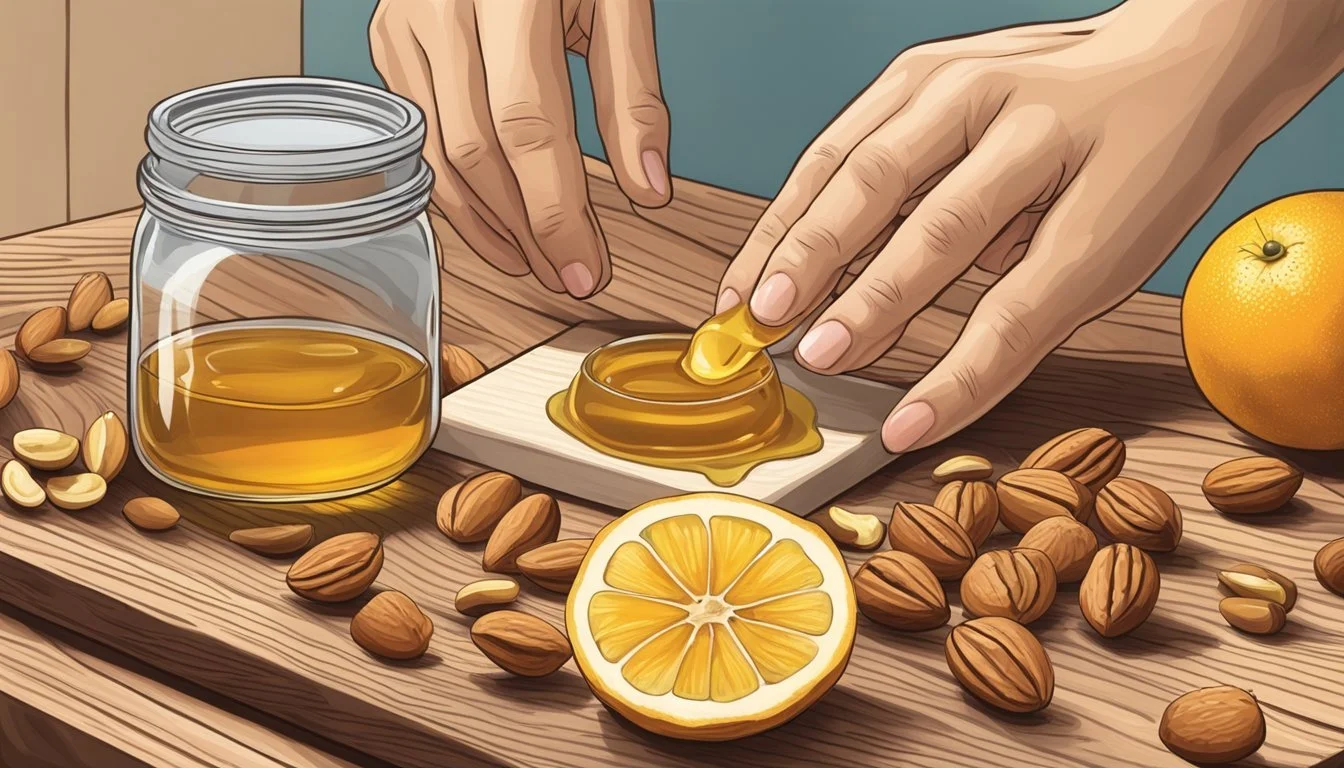Fixing Overly Salty Jerky
Tips for Restoring Flavor Balance in Your Snacks
Overly salty jerky can be a disappointing experience for snack enthusiasts. The key to delicious jerky lies in the balance of flavors, where saltiness plays a crucial role, but too much can overpower the natural taste of the meat and the blend of spices. Fortunately, there are proven methods to rectify this issue and restore the jerky's palatability, making it enjoyable once again.
Correcting the saltiness of jerky is not only about improving taste but also about catering to health considerations. Consuming high levels of salt can be of concern to some individuals, so reducing the sodium content in jerky snacks is beneficial from a nutritional standpoint as well.
Using water to soak the jerky is a common and effective technique to draw out excess salt. This process can be delicate, with the soaking time depending on just how salty the jerky is. Frequent water changes during the soaking can facilitate better salt extraction. This simple yet precise method aids in achieving the right balance, ensuring that the jerky maintains its intended flavor profile without being excessively salty.
Understanding Salty Jerky
When it comes to jerky that tastes overly salty, there are specific culprits, impacts on the culinary experience, and health implications. It is essential for enthusiasts to recognize the causes, understand its effect on enjoyment, and consider the health aspects of over-salted jerky.
Causes of Excessive Saltiness
The primary role of salt in jerky is as a preservative to extend shelf life by inhibiting bacterial growth. However, this can lead to high salt content when:
There is an error in the curing process, leading to too much salt being added.
The curing time is too long, allowing the meat to absorb more salt.
Impact on Flavor and Enjoyment
Too much salt can overpower the innate flavors of the meat, masking the subtle notes that define quality jerky. Overly salty jerky might:
Distract the palate, making the snack less enjoyable.
Make it challenging to taste other seasonings and spices in the jerky blend.
Health Considerations of Over-Salting
While salt is an essential part of any diet, excessive intake, especially through snacks like cured meats (What wine goes well with cured meats?), can have health consequences. Overly salty jerky contributes to:
Increased blood pressure, as excess sodium intake can cause the body to retain water.
Potential long-term health risks such as heart disease, stroke, and kidney issues.
Selecting Ingredients to Balance Salty Jerky
The key to reducing the saltiness of jerky lies in careful selection of ingredients that complement and counterbalance excessive salt.
Choosing the Right Meat
Selecting the appropriate type of meat is crucial when aiming to balance out overly salty jerky. Lean beef is often recommended due to its low fat content, which can help prevent the jerky from becoming too tough or overly salty after the curing process. It is best to opt for cuts like top round or flank steak.
Using Reduced-Sodium Alternatives
Employing the use of reduced-sodium soy sauce or other low-salt brines can significantly cut down on the overall salt content of jerky. This helps maintain desired flavors while keeping salt levels in check. One may explore various spices and sugar as a seasoning alternative to compensate for reduced salt levels.
Incorporating Natural Flavors
Natural flavors can boost the taste profile of jerky without increasing saltiness. Elements such as citrus fruits—lemon or lime juice—can be used to marinate the meat, which adds a tangy zest and can help neutralize some of the salt. Additionally, integrating other natural flavors like smoked paprika, garlic powder, or onion powder can enhance the jerky's taste complexity. Using water or alternative solutions like vinegar or fruit juice during the soaking process can also aid in drawing out excess salt.
Proper Marinating Techniques
To ensure that jerky achieves the right balance of flavors without becoming overly salty, attention to marinating techniques is crucial. Proper marination not only infuses the meat with flavor but also plays a role in determining the final taste experience.
Optimal Marinating Time
For jerky, the optimal marinating time typically ranges from 6 hours to overnight. This time frame allows the meat to fully absorb flavors without over-saturating. Take caution not to marinate for too long, as this can lead to a mushy texture or overly intense flavors that overshadow the natural taste of the meat.
Balanced Marinade Recipes
Marinades are composed of a careful blend of ingredients. A balanced marinade should include:
A base (often soy sauce for umami flavors).
An acid (like vinegar or citrus juice) to tenderize and enhance flavor profiles.
Complementary spices and sweetening agents to level out the saltiness.
To prevent the jerky from being too salty, one could start with a lower sodium base and avoid adding extra salt to the marinade.
Ingredients Amount Purpose Low-sodium soy sauce 1 cup Base Apple cider vinegar or lemon juice 1/4 cup Acid and Flavor Brown sugar or honey 1-2 tbsp Sweetener and Flavor Garlic powder, onion powder, black pepper To taste Seasoning
It's important to taste test the marinade before adding the meat and adjust the ingredients accordingly.
Marinating with Acids
Incorporating acids such as vinegar or citrus juice can have dual benefits: they help to tenderize the meat and provide a counterpoint to the saltiness. When using acids, one should consider the following:
Apple cider vinegar gives a subtle sweetness and tang.
Lemon juice offers a bright, citrusy zing that can enhance the other flavors in the marinade.
The amount of acid should be proportional to the other ingredients to avoid overpowering the meat. A rough guideline is to maintain a ratio of 1 part acid to 4 parts base.
Adjusting the Salty Flavor Post-Marination
After marinating jerky, the flavors can sometimes be too intense. There are methods to adjust the saltiness without compromising the jerky's quality.
Rinsing Methods
To mitigate excessive saltiness, rinsing the jerky under cold water is a straightforward approach. Rinse each strip in a bowl of cold water, swirling it gently to wash away surface salt.
Duration: Rinse for 15 to 30 seconds per strip.
Effectiveness: Removes superficial salt but may not change deeper flavors.
Soaking Strategies
Longer soaking times allow for a more thorough reduction in saltiness, as water can draw out the salt from within the jerky.
Water Soaking:
Place jerky in a bowl, cover with water.
Soak for 30 to 60 minutes.
Check flavor at intervals and change the water if it becomes too salty.
Milk Soaking:
Submerge jerky in a bowl of milk.
Soak for up to an hour to also impart a milder taste.
Using Sweet and Spicy Elements
Introducing sweetness or spicy components can counterbalance the salt and add complexity.
Honey or brown sugar:
Mix a small amount into a water solution.
Submerge the jerky and soak briefly to not overpower with sweetness.
Chili powder or cayenne pepper:
Sprinkle lightly after rinsing.
Adjust the amount to achieve desired level of spiciness without overwhelming the jerky.
The effectiveness of these methods may vary depending on the initial salt content and individual palates.
Cooking and Drying Techniques
In making jerky, the cooking and drying process is as crucial as the seasoning. It's important to control these steps to achieve the ideal texture and flavor while preventing over-salting.
Dehydrating Jerky Properly
Using a dehydrator is a preferred method for many jerky enthusiasts. When dehydrating jerky:
Temperature: Set the dehydrator to 160°F (71°C) to ensure safe food handling.
Time: Typically, it takes about 4 to 6 hours to dehydrate jerky, but this can vary depending on thickness and moisture content.
Thickness: Cutting meat to a consistent thickness (about 1/4 inch) promotes even drying.
Oven Drying Tips
For those without a dehydrator, an oven can serve as an effective alternative. Here's how to do it:
Temperature: Preheat the oven to 175°F (80°C) as the lowest setting is usually sufficient.
Airflow: Crack the oven door open slightly to improve airflow, which is vital for even drying.
Baking Sheet: Place the jerky strips on a wire rack over a baking sheet to catch drips and allow for heat circulation.
Utilizing Smokers and Smoking Methods
Smokers infuse jerky with a rich, smoky flavor while also drying the meat. When smoking jerky:
Temperature: Maintain a low temperature, around 150-160°F (65-71°C), to prevent cooking the meat too quickly.
Wood Choice: Different woods impart different flavors; hickory and mesquite are popular for their robust notes.
Time: Smoking can take longer than dehydrating, often requiring 6-8 hours, depending on the desired level of smokiness and meat thickness.
Post-Cook Adjustments and Remedies
After cooking, overly salty jerky can still be salvaged. It involves either diluting the salt content or complementing the snack with other flavors and textures to mitigate the salty taste.
Diluting Overly Salty Jerky
One can reduce the saltiness of jerky by soaking it in cold water. This method involves submerging the jerky strips in a large bowl filled with cold water. For best results, let the jerky soak for approximately 30 minutes. Change the water every 10-15 minutes to enhance the salt removal process.
Besides water, milk is another effective diluting agent. It's particularly helpful because it can also mellow out stronger flavors. Soaking in milk follows the same procedure as water but adds a depth of flavor that water cannot.
Adding Toppings and Sides
In addition to diluting the saltiness directly, one can also introduce other ingredients and side dishes that balance and absorb the excessive seasoning. When creating a complementary side or topping, consider the following options:
Fresh Salads: The crispness of fresh vegetables can counterbalance the saltiness. Use greens such as arugula or spinach which have a peppery note to contrast the jerky's salt.
Hearty Sandwiches: Incorporating jerky into a sandwich with a generous serving of vegetables and unsalted sauces can distribute the salty taste evenly throughout the meal.
Coating with Complementary Spices: Briefly re-coating the jerky in a mixture of sweet or tangy spices can reduce the salty impact on the palate.
Remember to balance the flavors carefully; the goal is to complement the jerky, not overpower it.
Serving and Pairing
When dealing with overly salty jerky, the right accompaniments can help balance the flavors and create a more harmonious snack experience. Complementary dishes and beverages are key in offsetting the saltiness and enhancing the overall taste.
Choosing Complementary Dishes
Complementing jerky with other food items can mitigate its salt intensity. Cheeses, particularly mild ones, can offer a creamy texture and subtle taste that contrast well with the robustness of the jerky. Here are a few recommended combinations:
Mild cheeses: Brie, mozzarella, or Swiss
Soups and stews: Opt for those with rich flavors like beef stock-based or vegetable soups that do not have added salt
Dishes: Include items with a sweet or acidic profile like fruit-based dishes or those with a touch of vinegar
By selecting dishes that contrast with the saltiness of the jerky, diners can enjoy a more balanced taste experience.
Beverage Pairings
Selecting the right beverage can greatly enhance the enjoyment of salty jerky. Neutral and palate-cleansing drinks are especially effective. Here's a concise pairing guide:
Craft beers: Choose ones that are bold and hoppy to stand up against the strong jerky flavor
Wines: Pair with a full-bodied red wine that complements the savory notes
Water: Simple and always effective, it cleanses the palate between bites
Through thoughtful beverage pairings, the saltiness of jerky can be pleasantly offset, making for an enjoyable culinary adventure.
Preservation and Storage
Proper preservation and storage are pivotal for maintaining the quality and safety of beef jerky. These methods prevent spoilage and keep the jerky's savory flavors intact.
Proper Jerky Storage Techniques
Once beef jerky is made or purchased, its longevity depends on how it is stored. Jerky should be kept in airtight containers to prevent exposure to humidity and contaminants. For short-term storage, zip-lock bags are sufficient, but for longer periods, vacuum-sealed bags are recommended. Storing jerky in a cool, dark place helps to prevent the growth of bacteria and maintains its quality.
Extending Jerky Shelf Life
To extend the shelf life of jerky, preservatives like curing salts can be used. These salts contain sodium nitrite, which serves two functions: it inhibits the growth of bacteria and helps to maintain the jerky's color and flavor. It's crucial to ensure that the beef jerky is thoroughly dehydrated before storage. Inadequate dehydration can lead to bacterial growth, which diminishes its shelf life. Regularly inspect stored jerky for any signs of spoilage, such as off odors or mold.
Understanding and Adjusting Flavors
When working with overly salty jerky, a cook's ability to understand and manipulate flavors is crucial. By adjusting acidity and balancing taste components, one can transform a mistake into a delightful snack.
The Role of Acidity in Flavor
Introducing an acidic component can help counteract the overpowering saltiness of jerky. Acidic ingredients such as vinegar or citrus juice add a tangy dimension that can bring out the complexity in savory snacks. (What wine goes well with savory snacks?) They can engage different taste buds and distract from the saltiness.
Balancing Sweet, Tangy, and Savory
To create a harmony of flavors in jerky, one might consider the addition of sweet or tangy profiles to complement the existing savory taste. Adding ingredients like sugar can introduce a sweet contrast, while spices such as garlic powder and onion powder contribute to the overall savory flavor. Here's a simple breakdown:
Sweetness: Consider incorporating a modest amount of sugar or honey.
Tanginess: Spices like garlic and onion powders add depth beyond mere saltiness and can be balanced with a touch of acidity.
Conducting a Taste Test
After making adjustments, conducting a taste test is essential to gauge whether the new flavor balance has been effective. Starting with small amounts, one should add the new ingredients incrementally, tasting frequently to avoid overcompensating for the saltiness. It allows for real-time feedback and fine-tuning, ensuring the final product is well-rounded and pleasing to the palate.
Creative Alternatives and Variations
When addressing the issue of overly salty jerky, culinary enthusiasts and home cooks can think outside the box by incorporating international cuisines and crafting their own culinary creations.
Experimenting with International Cuisines
For those looking to draw inspiration from around the globe, international cuisines provide a plethora of flavor profiles that can be adapted to jerky preparation. For example, a Korean-inspired jerky might use a marinade featuring less salt and more sweet and umami notes, such as pear juice and soy sauce, to counteract excessive saltiness. Similarly, a Latin American twist could include a citrus-based marinade with lime juice, which not only adds vibrant taste but can also tenderize the meat and reduce the salty flavor.
Cuisine Marinade Ingredients Flavor Profile Korean Pear juice, soy sauce, garlic Sweet, umami, aromatic Latin American Lime juice, chili, cilantro Citrusy, spicy, fresh
Crafting Culinary Creations
The home cook's kitchen is a canvas for culinary creations that can effectively balance jerky's flavors. They might incorporate unsalted stocks or fruit juices as soaking fluids, in addition to or instead of water, to infuse jerky with layered tastes that distract from the salt. Additionally, integrating unsalted nuts, seeds, or dried fruits into the jerky snacking experience can help to mute saltiness while adding textural contrast.
Soaking Liquids:
Apple juice
Pineapple juice
Unsalted beef or vegetable stock
Additions for texture and taste:
Almonds (unsalted)
Pumpkin seeds (unsalted)
Dried cranberries
Home cooks and culinary enthusiasts can apply these strategies to balance and diversify their jerky's flavor profile, transforming a simple snack into a gourmet experience.
Concluding Advice and Tips
This section consolidates the optimal approaches for rectifying overly salty jerky and enumerates resources for further guidance.
Key Takeaways for Balancing Jerky Flavors
To alleviate the oversalting of jerky, soaking is a prime technique. Submerging the jerky in water for 30 minutes can extract excess salt. For those seeking to enhance the snack's savoriness, options abound. Incorporating herbs such as rosemary, thyme, and oregano can impart depth while countering saltiness. Garlic and paprika afford a bolder profile, whereas black pepper provides a kick without contributing to salt content. Alternatives like teriyaki and Worcestershire sauce can introduce a complex palette of sweet and tangy notes, mitigating salt's dominance. It's instrumental that taste adjustments are made in moderation to refine the jerky's flavor gradually, avoiding the overuse of any singular ingredient.
Herb Adjustments:
Use rosemary and thyme sparingly to infuse a fresh, woodsy aroma.
Add oregano incrementally to bestow a classic, earthy touch.
Condiment Considerations:
Introduce a small amount of teriyaki sauce for a sweet and savory blend.
Apply Worcestershire sauce judiciously, as it can both complement and overpower.
Spice Infusions:
Sprinkle garlic powder or minced garlic for a warm, aromatic essence.
Employ paprika for subtle heat and color, being cautious with quantities.
Black Pepper Balanced:
Freshly cracked black pepper adds a sharp yet non-saline spice that enriches flavor without exaggerating saltiness.
Additional Resources
For enthusiasts seeking to refine their jerky-making craft, a multitude of resources are available. Alton Brown's insights on food science can clarify the function of ingredients and their interaction with salt. Various culinary websites and forums host discussions and recipes tailored to jerky aficionados. Here, one can exchange tips with fellow snackers and gather innovative ideas to perfect their homemade jerky. Cookbook collections and cooking TV shows often feature segments on jerky preparation, where one can visualize the process and understand seasoning ratios effectively.











